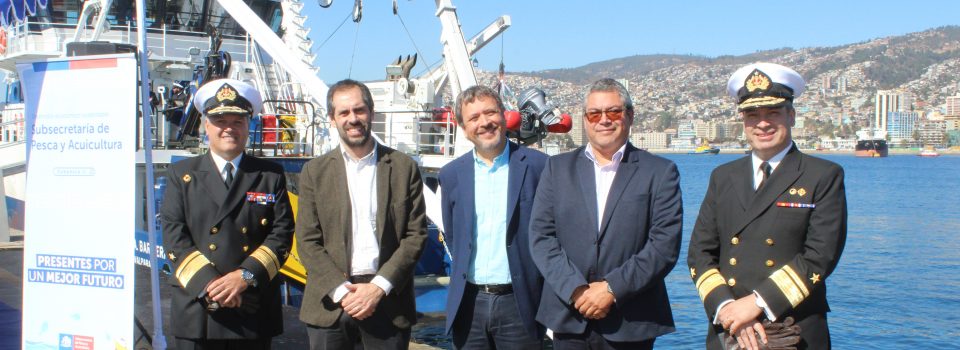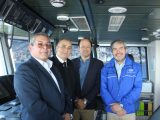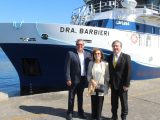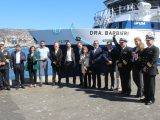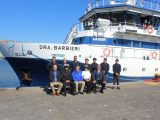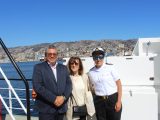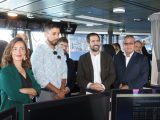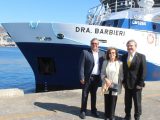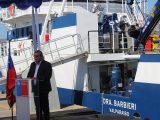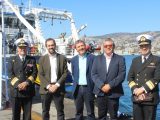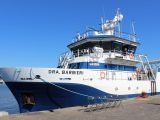Minister Grau and Undersecretariat Salas lead the ceremony for the start of operations of fisheries and oceanographic research vessel “Dra. “Barbieri”
April 22nd, 2024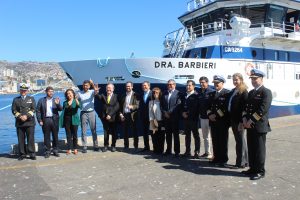 The vessel, whose first trip will be in May for crustacean research, will be operated by Fisheries Development Institute (IFOP) and has the capacity to accommodate eight scientists and eleven crew members.
The vessel, whose first trip will be in May for crustacean research, will be operated by Fisheries Development Institute (IFOP) and has the capacity to accommodate eight scientists and eleven crew members.
VALPARAÍSO, Tuesday, April 16th, 2024.- With a ceremony at Navy Shelter Molo in Valparaíso, chilean Government – through Fisheries and Aquaculture Undersecretariat (Subpesca) – officially gave the start point to start the work of brand new fisheries and oceanographic research vessel Dra. Barbieri. The vessel, which totaled a fiscal investment of just over US$14.5 million, will collect scientific data along the entire Chilean coast, including in inland waters, from the Canal Chacao to Golfo de Penas.
The event was headed by Minister of Economy, Development and Tourism, Nicolás Grau, and Fisheries and Aquaculture Undersecretariat, Julio Salas. Also present at the activity were Carolina Gainza Science Undersecretariat, Fisheries Commission Chamber’s president Jorge Brito, deputy Cristhian Moreira fromfishing commission; First Naval Zone head, Rear Admiral Roberto Zegers; Maritime Interests and Aquatic Environment director, Rear Admiral Nelson Saavedra; IFOP’s executive director, Gonzalo Pereira Puchy, plus representatives from IFOP, Sernapesca, Indespa, Subpesca, Asenav and the Navy. In the instance, of course, doctor in Oceanography, María Ángela Barbieri, also participated.
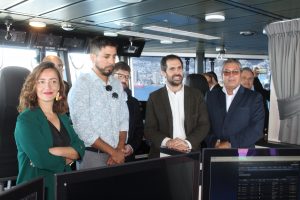 In this context, Minister Grau pointed out that “perhaps one of the most important innovations that we have made during this Government was the Sustainable Productive Development program’s creation, where we have worked with the Ministry of Science, together with other ministries, to invest more in science, technology, knowledge and innovation, oriented to challenges that we have as a country, environmental challenges, productive challenges. This vessel precisely has that element at its center, the importance of creating capabilities that allow us to have scientific knowledge to make better public policy decisions.”
In this context, Minister Grau pointed out that “perhaps one of the most important innovations that we have made during this Government was the Sustainable Productive Development program’s creation, where we have worked with the Ministry of Science, together with other ministries, to invest more in science, technology, knowledge and innovation, oriented to challenges that we have as a country, environmental challenges, productive challenges. This vessel precisely has that element at its center, the importance of creating capabilities that allow us to have scientific knowledge to make better public policy decisions.”
In his side, Undersecretariat Salas emphasized that “the more and better quality research is done in Chile, the better public policies can be promoted for fishing activity development” and explained that “one of the new Fishing Law pillars is its scientific pillar reinforcement in decision-making (…) that fisheries management decisions do not depend on current authorities whim, but rather have a scientific basis with the best science available, and obviously that means having “better instruments that allow these investigations to be carried out.”
A specific example of this is that Subpesca periodically reports fisheries status”and it would be impossible to report on it if we did not have research programs that allow us to monitor resources status” added the undersecretariat.
Meanwhile, Carolina Gainza Science Undersecretariat, highlighted the privilege of having the coast that this country has, a “navigable laboratory” for which it is necessary to “continue developing this type of research vessels because we have a great coast (…) This research not only has to look at what we can do with it in terms of productive resources, but also how we take care of it. The research that is carried out on this ship has that sea’s sustainability view.”
A specific example of this is that Subpesca periodically reports the status of the fisheries “and it would be impossible to report on it if we did not have research programs that allow us to monitor the status of these resources,” added the undersecretary.
Meanwhile, the Undersecretary of Science, Carolina Gainza, highlighted the privilege of having the coast that this country has, a “navigable laboratory” for which it is necessary to “continue developing this type of research vessels because we have a great coast (…) This research not only has to look at what we can do with it in terms of productive resources, but also how we take care of it. The research that is carried out on this ship has that view of the sustainability of the sea.”
High level research
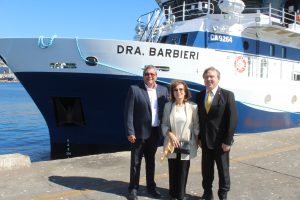 Dr. María Ángela Barbieri had words to highlight that Chile is part of the great Humboldt ecosystem, one of the most prosperous in the world, and that in climatic change times “having a ship like this, where we can see everything that happens from the surface to the bottom of the sea, we see existing resources, phytoplankton, zooplankton, all kinds of fish, but also all environmental variables, and with an information processing and acquisition system that allows us to do work practically in “real time, it’s wonderful.”
Dr. María Ángela Barbieri had words to highlight that Chile is part of the great Humboldt ecosystem, one of the most prosperous in the world, and that in climatic change times “having a ship like this, where we can see everything that happens from the surface to the bottom of the sea, we see existing resources, phytoplankton, zooplankton, all kinds of fish, but also all environmental variables, and with an information processing and acquisition system that allows us to do work practically in “real time, it’s wonderful.”
“Dr. Barbieri” was built in Valdivia by ASENAV shipyard, reaching 30.8 meters long (length), 9 meters wide (beam) and measuring up to 3.9 meters high (depth). One of its main characteristics is its 3 meters draft. Therefore, it becomes a scientific vessel capable of navigating in shallow waters along the entire country coast.
This vessel, whose first trip will be for crustacean research during May, will be operated by Fisheries Development Institute (IFOP) and has the capacity to accommodate eight scientists and eleven crew members. In addition, it has a system that reduces noise radiated into the water, to avoid marine habitat interference. Likewise, since its propulsion system is diesel-electric, it generates fewer emissions, therefore, it is environmentally friendly.
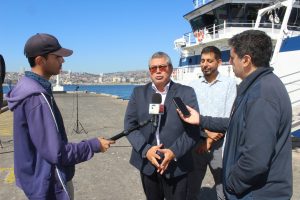 Faced with this challenge, IFOP’s director, Gonzalo Pereira, highlighted that the vessel – which joins “Abate Molina” ship – represents an advance “both in terms of resources and oceanographic research and environment” and that they assumed “the challenge of being the vessel operators with great satisfaction and responsibility” for which they have been training with Subpesca officials. Along these lines, Pereira highlighted that Barbieri’s crew will be a “good balance between experience and youth” when considering a captain with an experienced career and a first female pilot, as well as students who graduated from crew schools in Valparaíso after an agreement they maintain wich aims promoting professions linked to the sea.
Faced with this challenge, IFOP’s director, Gonzalo Pereira, highlighted that the vessel – which joins “Abate Molina” ship – represents an advance “both in terms of resources and oceanographic research and environment” and that they assumed “the challenge of being the vessel operators with great satisfaction and responsibility” for which they have been training with Subpesca officials. Along these lines, Pereira highlighted that Barbieri’s crew will be a “good balance between experience and youth” when considering a captain with an experienced career and a first female pilot, as well as students who graduated from crew schools in Valparaíso after an agreement they maintain wich aims promoting professions linked to the sea.
En la prensa:
